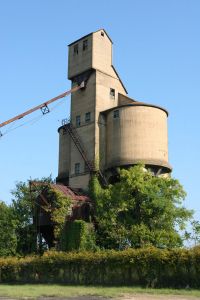Dukane Precast, Inc. v. Perez, a case from the United States Court of Appeals for the Seventh Circuit, involved employee who worked at a concrete products plant. This workplace accident occurred when employee was standing in a large sand bin trying to scrape sand from the sides of the bin. The bin was about 10 feet wide at the top opening and narrowed down forming a cone, which was 18 feet deep.
 While employee was scraping the sides of the bin, the sand on which he was standing gave way, causing him to sink into the sand and then get buried by more sand up to his neck. Employee screamed for help, and several employees heard him and came running to offer assistance. Despite their best efforts, they were only able to dig out the top portion of his body, so the tightly packed sand trapped him from his waist down.
While employee was scraping the sides of the bin, the sand on which he was standing gave way, causing him to sink into the sand and then get buried by more sand up to his neck. Employee screamed for help, and several employees heard him and came running to offer assistance. Despite their best efforts, they were only able to dig out the top portion of his body, so the tightly packed sand trapped him from his waist down.
At this point, other employees managed to find the plant manager to tell him what happened. This took about 10 minutes. Plant manager went to the bin and decided there was no emergency, as employee was in no immediate danger. Other employees told plant manager they believed they could dig him out, so manager left them on their own to try to free trapped employee. Employees tried their best to dig him out but were not trained in how to help him, and the sand removed only left a space for more sand to fall into the holes, thus increasing pressure exerted on trapped employee. He pleaded with everyone to dial 911, but, according to court records, nobody called for assistance.
Eventually another employee told plant manager about victim’s wish to have someone call 911, and after asking employees if they thought they could get him out, he allowed them to call 911. A few minutes after their call to 911, the local fire department rescue unit, which possessed specialized training and equipment for freeing buried victims, arrived. Employee had been trapped in the sand for more than 90 minutes. The rescue workers used a specially designed vacuum truck with a suction pump to remove the sand from the bin and rescue trapped employee. This process took around three and a half hours, but the total process took around five hours, due to the long delay in calling for help.
Victim suffered serious injury to his lower body as a result of this on-the-job accident. As our Boston workers’ compensation attorneys can explain, after this type of serious industrial accident, the United States Occupational Safety and Health Administration (OSHA) is required to perform an investigation. During the course of its investigation, OSHA found several serious safety violations and also found one of these violations to be willful in nature.
OSHA levied a significant fine on employer due to this willful safety violation, and employer appealed. On appeal, employer’s contention was that a proper determination of whether the alleged violation was willful was not made in the lower court. The court of appeals denied employer’s petition.
If you or someone you love has been injured a Boston work accident, call for a free and confidential appointment at (617) 777-7777.
Additional Resources:
Dukane Precast, Inc. v. Perez, May 11, 2015, U.S. Court of Appeals for the Seventh Circuit
More Blog Entries:
Elevator Mechanic Killed when Falling Down Shaft, Jan. 24, 2015, Boston Workers’ Compensation Lawyer Blog
 Massachusetts Workers Compensation Lawyers Blog
Massachusetts Workers Compensation Lawyers Blog

